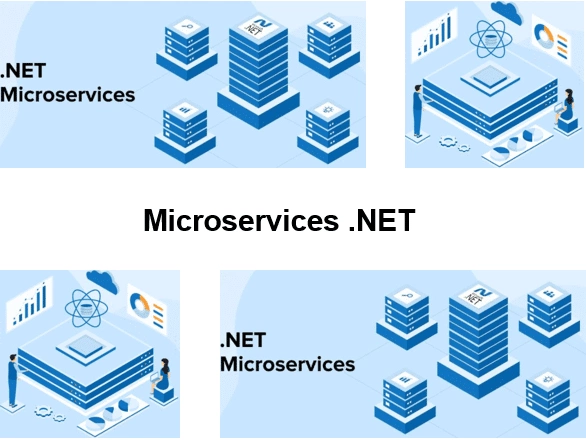-
Learning by doing
-
Trainers with practical experience
-
Classroom training
-
Detailed course material
-
Clear content description
-
Tailormade content possible
-
Training that proceeds
-
Small groups
In the Microservices dotNET course from SpiralTrain, participants learn to build and manage scalable microservices using ASP.NET Core, event-driven architectures, API gateways, containerization, and Kubernetes deployments.
The course starts with an overview of microservices architecture, including benefits, challenges, decomposition strategies, domain-driven design (DDD), and designing bounded contexts.
Participants learn to build microservices with ASP.NET Core, including minimal APIs, API versioning, service configuration, and applying Clean Architecture principles.
Participants learn about synchronous and asynchronous communication, building an API Gateway with YARP, using gRPC for high-performance communication, and service discovery.
This module covers securing microservices using OAuth 2.0, OpenID Connect, Identity Server integration, API authorization policies, distributed identity, and API gateway security.
Participants dive into event-driven systems, message brokers (RabbitMQ, Kafka), event sourcing, the outbox pattern, sagas for distributed transactions, and event orchestration.
This module discusses challenges of distributed data, the CAP theorem, CQRS, eventual consistency, cross-service querying, and polyglot persistence strategies.
Participants learn transient fault handling, retries with Polly, circuit breakers, distributed tracing with OpenTelemetry, structured logging, and monitoring with Prometheus and Grafana.
The focus is on containerizing microservices with Docker, managing multi-service environments with Docker Compose, setting up CI/CD pipelines, and deploying to Azure Kubernetes Service.
Finally, participants explore advanced topics like micro frontends, hybrid architectures, serverless integration, event streaming, service mesh technologies, and best practices for scaling.
The Microservices .NET course is intended for experienced .NET developers who want to design and build scalable distributed applications based on microservices architecture.
Solid knowledge of C#, ASP.NET Core, and familiarity with API development, Docker, and distributed systems is required.
The training consists of interactive theoretical sessions, live demonstrations, and practical hands-on labs under the guidance of an experienced trainer.
Participants will receive a certificate of completion for the Microservices .NET course after successfully finishing the training.

Module 1: Intro Microservices |
Module 2: Microservices .NET Core |
Module 3: API Gateway |
|
What are Microservices? Microservices vs Monoliths Benefits and Challenges Domain-Driven Design Bounded Contexts Designing Microservices Evolutionary Architecture Microservices Patterns Decomposition Strategies Database per Microservice |
Building REST APIs Minimal APIs in ASP.NET Core Versioning APIs Model Validation Content Negotiation Health Checks Swagger and OpenAPI Service Registration and Discovery Service Configuration Options Pattern Microservices with Clean Architecture |
Synchronous Communication Asynchronous Communication Introduction to API Gateway Pattern Building an API Gateway with YARP Routing and Aggregation Authentication at Gateway Level gRPC Basics in .NET gRPC vs REST Service Mesh Concepts Using Dapr for Communication |
Module 4: Security |
Module 5: Event-Driven Architecture |
Module 6: Distributed Data |
|
Security in Microservices OAuth 2.0 and OpenID Connect IdentityServer Integration JWT Tokens and Validation Scopes and Claims API Authorization Policies User Authentication and Federation Distributed Identity Management Securing APIs behind API Gateway Handling Security at Service Mesh |
Event-Driven Architecture Overview Publish-Subscribe Pattern Message Brokers (RabbitMQ, Kafka) Event Sourcing Basics Integration Events Domain Events Idempotent Event Handling Outbox Pattern Saga Pattern Choreography vs Orchestration |
Challenges of Distributed Data CAP Theorem Database per Service Strategy Data Consistency Approaches Two-Phase Commit and Sagas CQRS Pattern Read Models and Write Models Eventual Consistency Cross-Service Queries Polyglot Persistence |
Module 7: Resilience |
Module 8: Containerization |
Module 9: Advanced Microservices |
|
Transient Fault Handling Retry Policies with Polly Circuit Breaker Pattern Timeout and Bulkhead Isolation Distributed Tracing (OpenTelemetry) Structured Logging with Serilog Centralized Logging with ELK Stack Prometheus and Grafana Health Checks Metrics Aggregation and Alerting |
Introduction to Containers Dockerizing .NET Microservices Creating Dockerfiles for Services Multi-Stage Builds Using Docker Compose Container Registry (ACR, DockerHub) Continuous Integration with GitHub Continuous Deployment to AKS Helm Charts for Deployment Rolling Updates |
Micro Frontends and Microservices Serverless and Microservices Hybrid Architectures Edge Services Event Streaming Architectures Domain-Oriented Microservices Service Mesh Advanced Topics Federated Identity across Services Multi-Cluster Deployments Best Practices for Large Systems |
